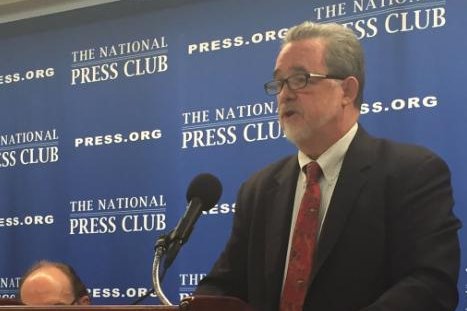Ray Offenheiser, president of the humanitarian aid group Oxfam America, discussed the response to the humanitarain crisis in Syria at the National Press Club on Thursday. Photo from Twitter/Oxfam
WASHINGTON, March 3 (UPI) -- International humanitarian aid groups that have moved into Syria amid a cease-fire said families are living in caves and hospitals have been dug underground to treat the sick and injured.
Even with the United States-Russia brokered agreement that began Friday, airstrikes are continuing in Aleppo, closing main roads through the area and cutting access to those who need assistance, said Neal Keny-Guyer, CEO of Mercy Corps, the largest non-governmental responder in Syria.
The cease-fire has allowed aid workers to provide assistance, but a wider-ranging plan must be drafted to address longterm aid, he said.
"Ultimately, the solution is political," he said. "We can still save Syria but time is short."
Keny-Guyer joined Ray Offenheiser, president of the humanitarian aid group Oxfam America, and Dr. Zaher Sahloul, past president and senior advisor to the Syrian American Medical Society, in a National Press Club Newsmaker discussion about the crisis in Syria on Thursday.
The agency leaders called for nations to open their doors to refugees and provide more assistance as the cease-fire continues into peace talks slated to begin Wednesday. Offenheiser said refugees who can work can make positive contributions to communities due to their diverse skills and experiences. But they are being shunned from countries including the United States as a result of baseless fear, Sahloul said.
Of the refugees, the Syrian children have the most to lose because they are not being educated, increasing the risk of "losing a generation of young people," Keny-Guyer said.















